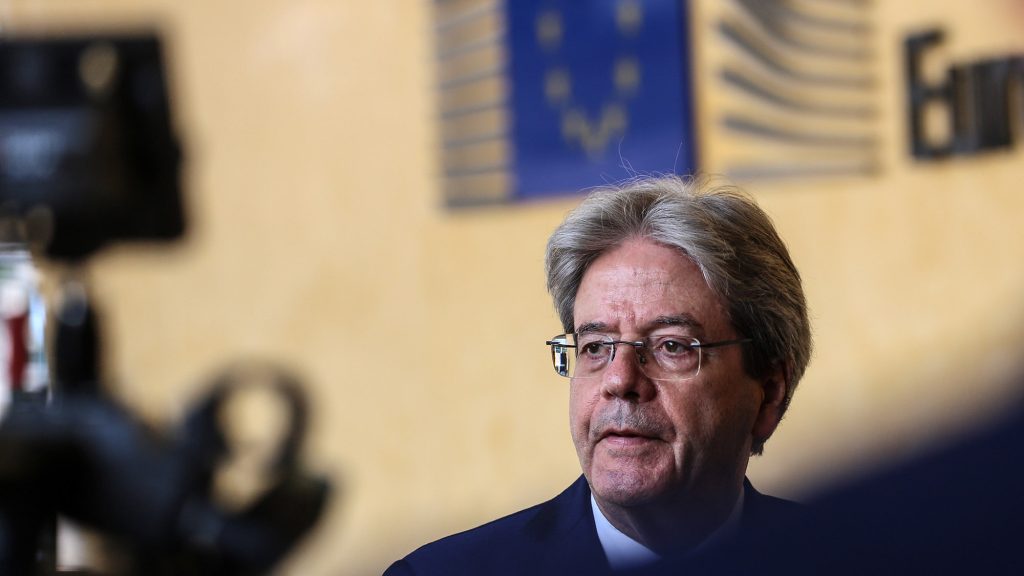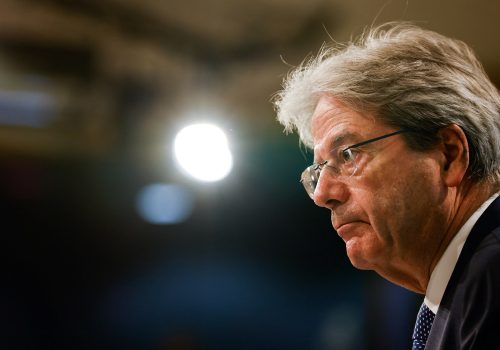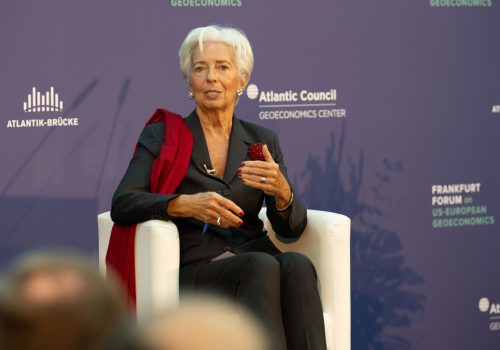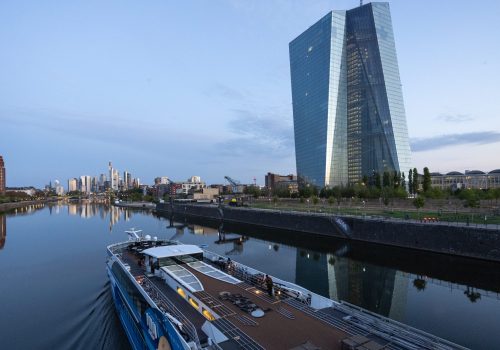Watch the full event
On September 28, 2022, at the Frankfurt Forum for US-European GeoEconomics, EU Commissioner for Economy Paolo Gentiloni spoke about responding to Russia’s invasion of Ukraine with transatlantic partners. Below are his remarks as prepared for delivery; the full transcript of his appearance with his speech as given can be found here.
The EU and the United States have deep economic and political ties, rooted in our shared history, culture, and values. Like in every relationship, we have our ups and downs. But we can be sure of one thing: In times of crisis, we always come together. At every historic turning point since [World War II], we have stood side by side: with the Marshall Plan; during the Cold War and the fall of the Iron Curtain; and now in the face of Russia’s war of aggression in Ukraine.
War in Ukraine—a new impetus for EU-US relations
Since February, we have come together to impose unprecedented sanctions against Russia’s brazen breach of international law. We have come together to provide crucial military and financial assistance to Ukraine. And we have come together to weaken Russia’s grip on our energy markets.
Let me be clear: Our common response is working.
Our support is helping Ukraine keep the state running while its inspiring armed forces turn the tide of the war.
The sanctions are steadily eating away at Russia’s economy, which is set to shrink markedly both this year and next. Russia’s own federal labor service has stated that three thousand brands have put business on hold since the invasion, with five hundred foreign companies having been liquidated by the end of July at a cost of 125,000 jobs.
Russia’s imports from the [European Union (EU)] fell by around 50 percent in the period March to June, compared with the same period last year.
Russia’s imports of [information technology] equipment have tumbled, despite its legalization of parallel imports. Blocked access to updates of Western software, essential spare parts, and semiconductors are having a grinding effect on industry. Many of the few cars now produced in Russia—data over the summer indicated that sales were down by more than 70 percent compared to the same period last year due to the collapse in production—are without airbags, [Anti-lock Breaking Systems (ABS)], and catalytic converters.
Russia’s share in EU gas imports has fallen by two-thirds, from 45 percent before the war to 14 percent now. And its share of our pipeline gas imports has fallen by three quarters, from 40 percent to 9 percent. The deals we have struck with the United States and other partners to boost energy imports have made up for the cuts in Russian fossil fuels.
And the cap on the price of Russian oil exports agreed in principle at the [Group of Seven (G7)] level will put downward pressure on global energy prices and reduce the Kremlin’s ability to fund its war. Today we are setting out the legal basis to implement this key measure in the EU.
So our common response is working, and Russia’s recent moves—from halting gas deliveries via the Nord Stream 1 pipeline until sanctions are lifted, to the mobilization of reservists and sham referendums in occupied territories—are clear signs of that. Signs of weakness and of growing desperation. But also signs of escalation, to which we are responding with the adoption of an eighth sanctions package, as [EU President Ursula] von der Leyen has just announced.
Economic outlook
Clearly, the war and its consequences are weighing on economic prospects on both sides of the Atlantic.
The combination of high energy prices, high inflation (even if for different reasons), monetary tightening and extraordinary uncertainty are putting a damper on growth. Both the EU and the US will see positive growth for the year 2022 as a whole. But all the signs are pointing to a significant slowdown underway, such that a recession can no longer be ruled out.
To ensure our economies successfully navigate these troubled waters, we need to maintain agile and responsive fiscal policies, just as we did during the pandemic.
In the EU, we are pushing forward with the implementation of recovery and resilience plans as part of our NextGenerationEU response to the pandemic. And as part of our REPowerEU plan, we are now leveraging the extraordinary funds made available by NextGenerationEU to drastically reduce our reliance on Russian fossil fuels.
NextGenerationEU remains the strongest common tool we have at our disposal. And this is why I have made clear that while we are open to discussing limited and specific points, there should be no wholesale reopening of plans or postponing of key commitments.
Priorities for the future of transatlantic relations
In this context, I see three lessons or priorities for the future of our transatlantic relations.
First: Our strength lies in our unity, both within the EU and with our like-minded partners across the Atlantic and beyond. In the challenging months ahead, this unity will be tested again and again by those who seek to divide us. We must stay the course.
Second: In an increasingly multipolar world, the EU and the US must continue to work together every day, and not just in times of crisis, to show that liberal democracies can deliver sustainable and inclusive growth.
This has already started to happen. The arrival of the Biden administration marked a qualitative improvement in our relations.
Our economic agendas are very much aligned. In Europe, we are pursuing an ambitious path of investments and reforms to deliver on the triple transition: green, digital, and social. The Inflation Reduction Act in the US goes in a similar direction.
We are also looking more broadly at how our fiscal rules can better support investments in crucial areas while making sure debt levels remain sustainable. We will present our ideas on this next month.
Going forward, there is also scope to strengthen our trade cooperation. The disruptions to global supply chains brought about by the pandemic and the war must galvanize us to build safer, more resilient supply chains in strategic sectors. But we must resist the sirens of protectionism.
Third lesson: Transatlantic cooperation is a necessary but not sufficient condition to tackle the challenges the world is facing. For that, we need to muster much wider coalitions. And this is a challenge, as we have seen with the war in Ukraine.
Russia has openly challenged the rules-based international order. This is not a Western order. It’s an order that allows all countries to cooperate, prosper, and live peacefully side by side. An order where no country must fear being attacked by a more powerful neighbor. An order, in short, that it is in everyone’s interest to uphold.
Yet thirty-five countries, including three members of the [Group of Twenty (G20)] (China, India, and South Africa), decided to abstain in the UN Resolution condemning Russia’s invasion of Ukraine.
To increase our influence in other parts of the world, we need to invest in them. This is the key objective of our Global Gateway strategy to mobilize 300 billion euros in investments across the world, in line with the G7’s Partnership for Global Infrastructure.
We also need to work for a more effective multilateralism. A great example is last year’s global agreement to reform corporate taxation: an agreement for which the EU and the US worked hand in hand and which brought together more than 130 countries and jurisdictions.
This was made possible because everyone worked in a spirit of compromise to find a common solution. Here, too, implementation is not without its challenges. But I am confident that the spirit that led to that agreement remains alive and can guide us in meeting the common challenges we face.
Watch the Frankfurt Forum
Further reading
Wed, Sep 28, 2022
Full transcript: Paolo Gentiloni on signs the West’s sanctions on Russia are working—and the new packages on the way
Transcript By
The European Commissioner for Economy explained that to navigate today's troubled waters, the United States and European Union will need to stick together.
Wed, Sep 28, 2022
ECB chief Christine Lagarde: ‘Our primary objective is price stability’
New Atlanticist By
Europe's top banker shares her thoughts on the inflation crisis and much more during the Atlantic Council's Frankfurt Forum.
Tue, Sep 27, 2022
From sanctions to digital currencies, here’s a new transatlantic agenda for economic coordination
New Atlanticist By Charles Lichfield
At our Frankfurt Forum on US-EU GeoEconomics, the Council's original research lays out a long-term strategy for economic coordination in a world reshaped by Russia's invasion of Ukraine.
Image: EU Commissioner for Economy Paolo Gentiloni speaks to the press following a news conference on the 2022 Summer Economic Forecast at the European Commission headquarters. Photograph by Valeria Mongelli / Hans Lucas via Reuters.




